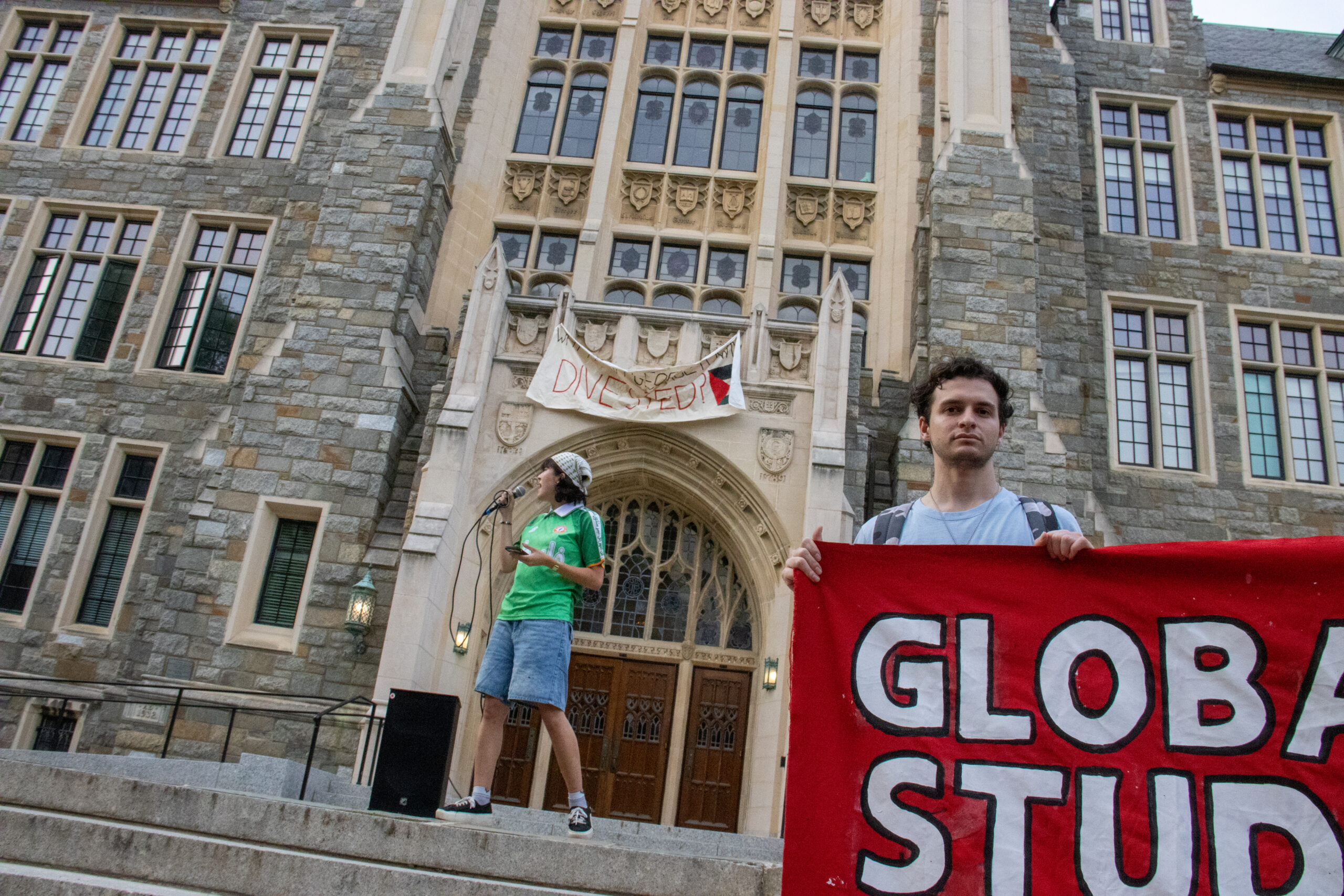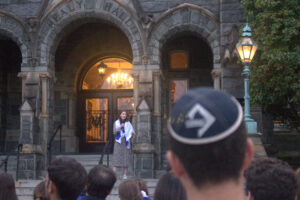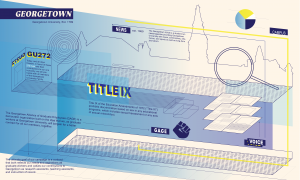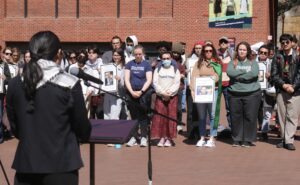Around 50 community members gathered in front of Healy Hall on Thursday evening to protest Georgetown’s refusal to implement a student referendum calling on the university to divest from companies connected to the Israeli military.
“Georgetown administration basically just said ‘fuck you’ after the students spoke and said we want divestment from genocide,” a student organizer for Georgetown Students for Justice in Palestine (SJP) said in a speech outside Healy.
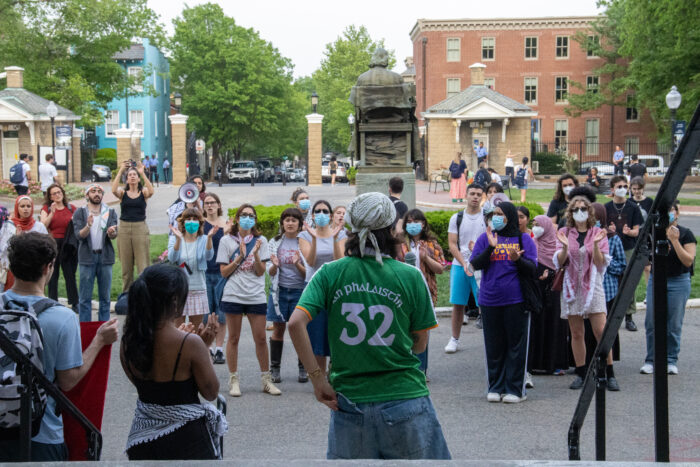 Photo by Connor Martin
Photo by Connor Martin
The rally on the Healy steps was co-publicized on Instagram by Georgetown SJP, D.C.-Maryland-Virginia SJP, Georgetown Faculty and Staff for Justice in Palestine (FSJP), Jewish Voice for Peace Georgetown, Georgetown Coalition for Workers Rights (GCWR), and the DMV Palestinian Youth Movement. As the sun set behind the stone buildings on the humid spring evening, students chanted: “Robert Groves, you hear us now? We demand divestment now!” and “Georgetown University, we know what side you’re on! Remember South Africa, Remember Vietnam!”
The rally comes shortly after a federal judge delayed ruling on Georgetown researcher Dr. Badar Khan Suri’s detention by federal immigration authorities in a hearing that ended at 3 p.m. The protest was originally scheduled for noon, but was moved later in the evening so that community members could attend court support at 1 p.m. for Khan Suri’s hearing.
The referendum, which closed on Monday, called on Georgetown to disclose and divest its holdings in companies that support the Israeli military. It also demanded the end of academic partnerships with Tel Aviv University and other Israeli institutions with “direct involvement in the occupation and genocide” in Palestine. Student referendums serve to provide the university with the student body’s views, but do not inherently impact university policy.
Georgetown currently holds over $55 million in investments in Alphabet and Amazon, two companies that develop technology for the Israeli government through Project Nimbus.
On Tuesday, May 29, the referendum passed with 67.9% of students voting in favor and 32.1% voting against it. According to the Election Commission, 29.5% of the student body—2,132 students—voted, above the 25% turnout required for the referendum to pass.
In an email from Interim President Robert M. Groves half an hour after referendum results came out, the university announced it will not change university policy.
“Georgetown will not implement this referendum, based on our institutional values and history and existing university resources and processes that address our investments,” Groves wrote.
“It was a blatant act of disrespect and complete disregard for any sort of democratic process. And we organized this action today to show the university that we will not stand for this,” Fiona (SFS ’26), a student organizer with GCWR, said to the Voice. “We are the ones who should dictate exactly what this university is doing and for it to value its profit and its bottom line over the voices of students who have committed to divesting from genocide, it’s just complete hypocrisy. It’s bullshit.”
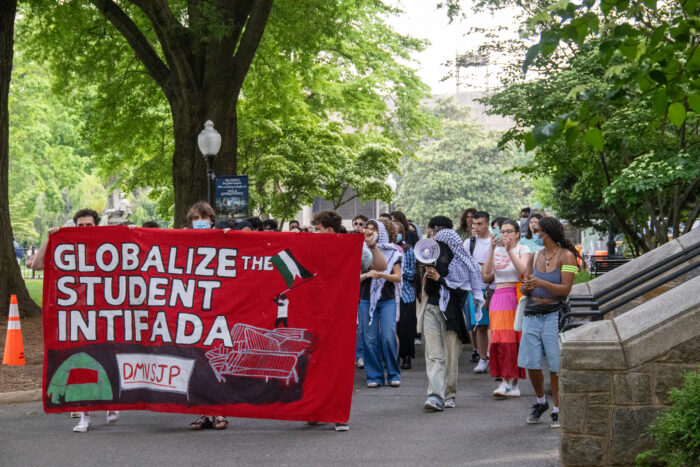 Photo by Connor Martin
Photo by Connor Martin
Georgetown adopted its Socially Responsible Investment (SRI) Policy in 2017, which commits the university to “exercising ethical management of the University’s endowment” while also “seeking to generate the highest level of returns,” according to Georgetown’s Investment Office website.
“Recognizing that the endowment shall not be used as a tool to promote a political agenda, the University shall continue to integrate its commitment to social justice, protection of human life and dignity, stewardship for the planet, and promotion of the common good into its investment management practices,” the policy reads.
In November 2024, FSJP put forward a Proposal for Investment in Equality, Human Rights, and Peace to the Committee on Investments and Social Responsibility, which enforces the SRI policy. Their proposal, which was not implemented, would add a “human rights” screen and commit Georgetown to “divesting from companies engaged in gross human rights violations, including war crimes, genocide, apartheid, and crimes against humanity.”
Speakers at the rally said that Israel’s bombardment of Gaza remains top of mind for many community members, even as it fades from news headlines. Since Israel broke the ceasefire in Gaza on March 18, the Israeli military has killed 2,300 Palestinians, bringing the total number of Palestinians killed in Gaza since October 7, 2023, to 52,400, including more than 15,600 children.
“We are on day 573 of Gaza’s live-streamed genocide. We have learned and parsed and argued over old and new terms: genocide, ecocide, domicide, scholasticide, wounded child with no surviving family,” an FSJP member said in their speech. “Limb amputations without anesthesia no longer make the headlines. The blockade against the entry of food, fuel, water, electricity, medicine is no longer newsworthy.”
This rally is the most recent of numerous marches, walkouts, and vigils calling for divestment in the last year. Last spring, community members delivered a statement to the president’s office signed by over 1,000 students, faculty, and staff and 15 organizations calling for Georgetown to divest from Alphabet and Amazon.
“We have pursued meetings with admin. We have gone the preferred route. We have gone to the Committee on Investment in Social Responsibility,” a member of FSJP said in a speech at the Thursday rally. “We have asked that this university implement and abide by its own investment policy. These paths have not yielded results, and that is why we are here today.”
Protesters marched from Healy to the front steps of White Gravenor, where organizers unfurled a banner from the balcony overlooking the White Gravenor patio. The banner read, “Why Hasn’t Georgetown Divested?” recalling a 1986 protest by Georgetown students calling for the divestment from South African apartheid.
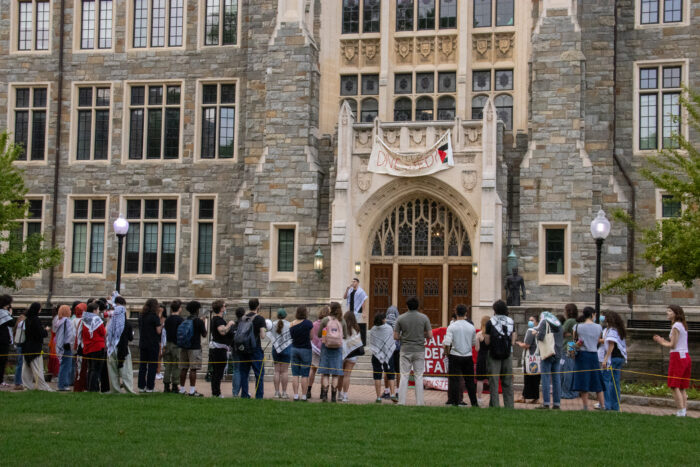 Photo by Connor Martin
Photo by Connor Martin
“We’re here today and hearkening back to that moment to remind people that it is possible for Georgetown divest,” Fiona said. “They have done it before. They divested from South African apartheid, and they will do it again.”
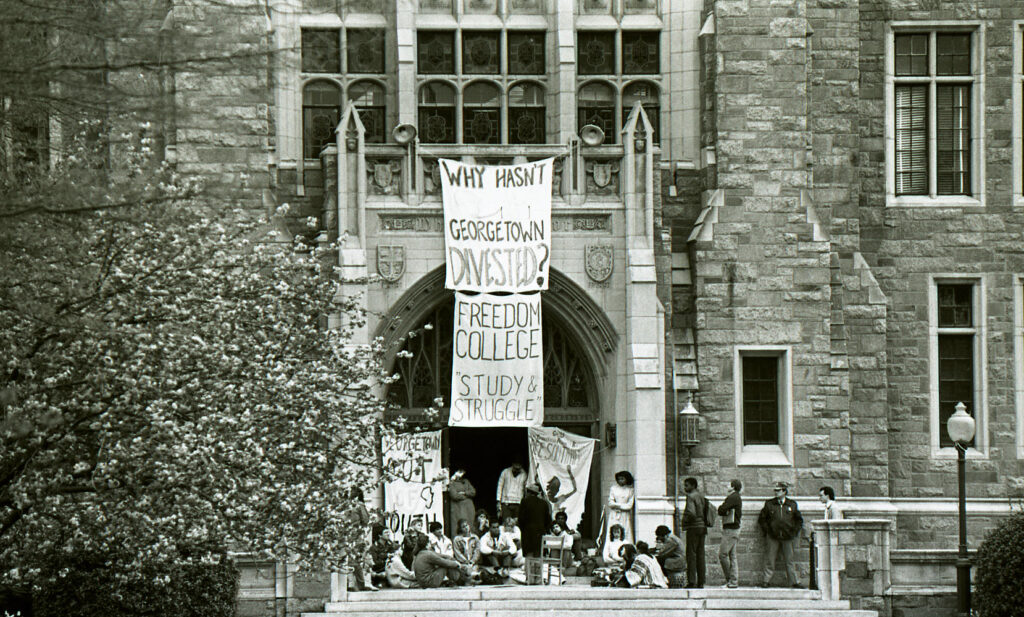 Photo courtesy of Lauinger Library
Photo courtesy of Lauinger Library
Student organizers shared that the protest was important to maintaining their momentum and persisting in their calls for divestment.
“We know we’re going into the summer. Obviously people are in finals right now, but we just want to let people know that this is not the end,” the student organizer with SJP said. “We always knew that the referendum can be one step on the journey towards divestment and obviously towards a fully liberated Palestine. And so this is just one step.”
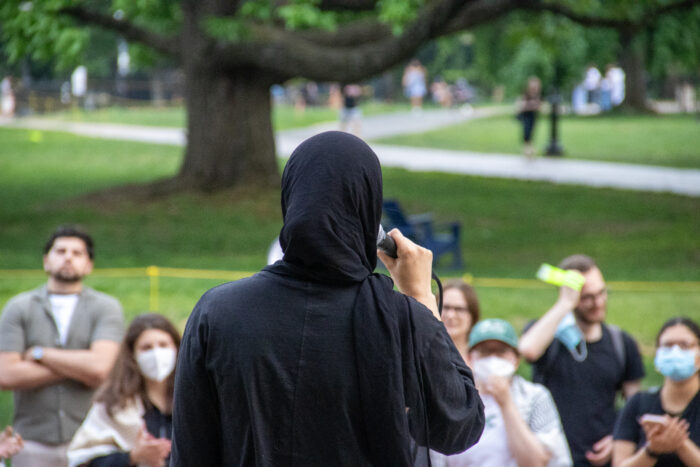 Photo by Connor Martin
Photo by Connor Martin
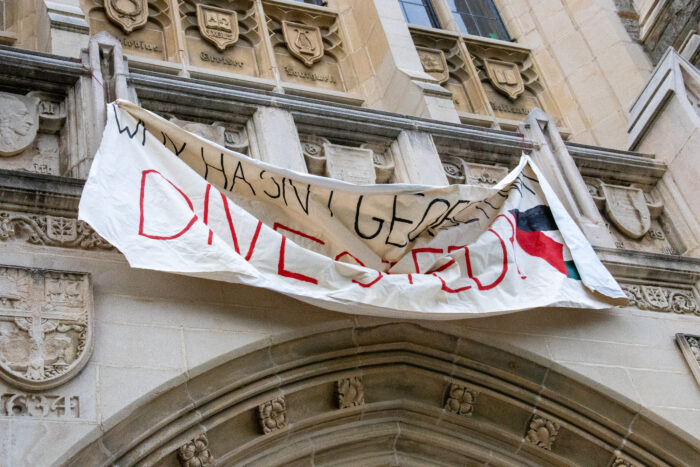 Photo by Connor Martin
Photo by Connor Martin


